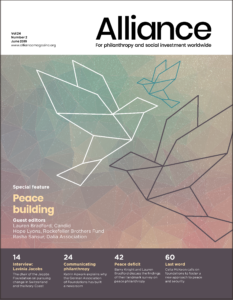Peace-building has a data problem. Or three, to be precise:
- Definitional issues – The field lags behind others like international development, not least because of a focus on amorphous concepts like social cohesion that are hard to identify, quantify, qualify, and categorize.
- Collection challenges – The fact that most peace-building occurs in conflict or conflict-prone regions where tensions and sensitivities are peaked increases difficulties.
- Personnel questions – Despite calls for more local voices and agency, key project elements – methodologies, funding, project leadership, and publications – are predominantly located at Euro-American institutions. The result is peace-building data incursions into conflict zones that are often limited by the lack of local context and inputs, with reliance on secondary media reporting compiled by foreign journalists. These dynamics also limit Africans’ access to data and its subsequent analysis. And worse, African researchers often go unacknowledged.
In 2017, spurred by inputs from African peace-building researchers, Carnegie Corporation of New York launched a request for proposals. Proposals presented pilot conflict-data projects addressing difficulties of data collection that were led by African organizations. In a twist compared to normal grantmaking practices, Carnegie Corporation asked the prospective African organizations to develop a partnership with a US organization rather than vice versa.
Two of the grants awarded through the process, to the Electoral Institute for Sustainable Democracy in Africa (EISA) and the Centre de Recherche et d’Action Pour la Paix (CERAP), specifically focus on data collection during conflict-prone election processes. Elections represent a challenging focal point for peace-building, often serving as either an entry or exit point from conflict. In post-conflict scenarios, elections are almost always the process through which regular competitive political dynamics resume. Conversely, contested and flawed elections can spiral into new forms of violent conflict and instability.
EISA, in partnership with the University of Michigan (Michigan) and the University of Witwatersrand is engaging African post-graduate students to collect polling station-level data, which can be analyzed for general and proxy causes of conflict. Already, this approach is forcing a broader re-evaluation of how EISA deploys election observers and the information necessary to explain the causes of election conflict. The research has already piloted in Mozambique in 2018 (local elections) and South Africa in 2019, and aims to look at Mozambique in 2019 (national elections) and Tunisia, as well as other African countries in 2020.
CERAP is partnering with the Center for African Studies University of California, Berkeley (Berkeley) to test four low-cost methods of collecting primary data on electoral violence in the run-up to and during the 2020 Cote d’Ivoire presidential elections. By identifying differences in data from election monitors, random calling techniques, crowd-seeding, and social media collection, it will be possible to understand the methods’ effectiveness and to triangulate the reporting directly from communities, local researchers, and journalists.
In parallel, CERAP and Berkeley are supporting corresponding peace-building programs before the presidential elections. The team developed trainings for community leaders in conflict prevention strategies during election periods. Communities that have had leaders participate will be monitored with these data collection techniques and compared to communities that did not participate. The goal is to identify the efficacy of this specific peacebuilding intervention.
Beyond these initiatives, funders and peace-builders have the opportunity to address peace-building’s data problem(s). Funders’ awareness of the data imbalance creates opportunities to support locally-led projects, establishes equitable participation, and recognizes researchers. Peace-builders can improve their engagement by bringing in context-based researchers during the development of the methodology to ensure that their data is contextualized by those living and working in the area, and acknowledging that their work is never done without the help of others. This, in turn, can begin to tackle collection issues and provide inputs that support refinement of definitional issues.
These projects, led by African institutions, are independently impressive and aim to have an impact on the peace-building practitioner and academic communities. Perhaps more important, is that both projects are part of a necessary shift towards weighting and valuing methodologies, initiatives, and inputs from researchers and practitioners based in the local context.
Arsene Brice Bado is an associate researcher at the Centre de Recherche et d’Action pour la Paix (CERAP)
Grant Masterson is Programme Manager: African Peer Review Mechanism at EISA
Aaron Stanley is Program Analyst at Carnegie Corporation of New York
 Peace-related philanthropy, at less than 1 per cent of all grantmaking, seems irresponsibly small given that armed conflict spoils lives, divides societies and ruins economies.
Peace-related philanthropy, at less than 1 per cent of all grantmaking, seems irresponsibly small given that armed conflict spoils lives, divides societies and ruins economies.
Our new issue goes in search of philanthropy’s role in peaceful development.








Comments (0)